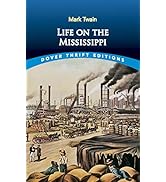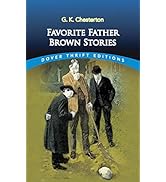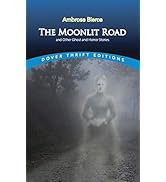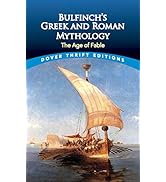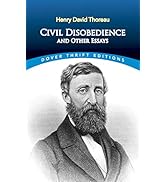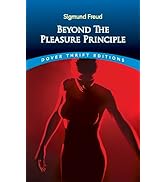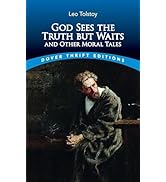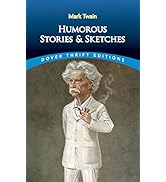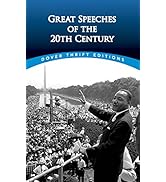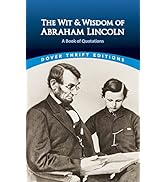
Enjoy fast, free delivery, exclusive deals, and award-winning movies & TV shows with Prime
Try Prime
and start saving today with fast, free delivery
Amazon Prime includes:
Fast, FREE Delivery is available to Prime members. To join, select "Try Amazon Prime and start saving today with Fast, FREE Delivery" below the Add to Cart button.
Amazon Prime members enjoy:- Cardmembers earn 5% Back at Amazon.com with a Prime Credit Card.
- Unlimited Free Two-Day Delivery
- Streaming of thousands of movies and TV shows with limited ads on Prime Video.
- A Kindle book to borrow for free each month - with no due dates
- Listen to over 2 million songs and hundreds of playlists
- Unlimited photo storage with anywhere access
Important: Your credit card will NOT be charged when you start your free trial or if you cancel during the trial period. If you're happy with Amazon Prime, do nothing. At the end of the free trial, your membership will automatically upgrade to a monthly membership.
Buy new:
$10.73$10.73
Ships from: Amazon.com Sold by: Amazon.com
Save with Used - Very Good
$8.60$8.60
Ships from: Amazon Sold by: Giant Giant

Download the free Kindle app and start reading Kindle books instantly on your smartphone, tablet, or computer - no Kindle device required.
Read instantly on your browser with Kindle for Web.
Using your mobile phone camera - scan the code below and download the Kindle app.



 Audible sample
Audible sample Babbitt (Dover Thrift Editions: Classic Novels) Paperback – September 22, 2003
Purchase options and add-ons
Widely considered Sinclair Lewis's greatest novel, this satire of the American social landscape created a sensation upon its 1922 publication. Babbitt's name became an instant and enduring synonym for middle-class complacency, and the strictures of his existence revealed the emptiness of the mainstream vision of success. His story reflects the nature of a conformist society, in which the pressures of maintaining propriety can ultimately cause individuals to lose their place in the world.
Babbitt ranks among the important 20th-century works addressing the struggles of people caught in the machinery of modern life, and it remains ever-relevant as a cautionary tale against clinging to conventional values.
- Print length320 pages
- LanguageEnglish
- PublisherDover Publications
- Publication dateSeptember 22, 2003
- Reading age14 years and up
- Dimensions5 x 0.75 x 8.5 inches
- ISBN-100486431673
- ISBN-13978-0486431673
- Lexile measure1110L
Discover the latest buzz-worthy books, from mysteries and romance to humor and nonfiction. Explore more
Frequently bought together

Customers who viewed this item also viewed
 Babbitt (Bantam Classics)Mass Market Paperback
Babbitt (Bantam Classics)Mass Market Paperback
From the brand

-

Debuting in 1990, the Thrift Editions library of classic literature is a top choice for teachers, students, librarians, and recreational readers around the world. Dover’s longstanding mission of exceptional value has consistently offered excellence in classic fiction, nonfiction, plays, and poetry.
Dover Thrift Editions are low priced, compact (5"x8"), complete and unabridged.
-
Are there any collections of stories or poetry in the Dover Thrift Editions?
In addition to single title books, Dover offers books of anthologies in fiction, non-fiction and poetry. Check out our Thrift Editions of short stories, literary collections, poetry, gothic and horror, SciFi/Fantasy, crime/mystery/thrillers and more. Happy Reading!
What formats are the Thrift Editions available in?
All are available in an easy to carry paperback version and most titles are available for the Kindle e-reader.
-
American History/History
-
Biography and Autobiography
-
Black History
-
Classic Novels
-
Crime, Mystery and Thrillers
-
Gothic and Horror
-
Literary Collections
-
Philosophy
-
Plays
-

-
Political Science
-
Poetry
-
Psychology
-
Religion
-
SciFi and Fantasy
-
Short Stories
-
Speeches and Quotations
From the Publisher


Sinclair Lewis (1785-1951)
American writer and playwright. In 1930, he became the first writer from the United States (and the first from the Americas) to receive the Nobel Prize in Literature, which was awarded "for his vigorous and graphic art of description and his ability to create, with wit and humor, new types of characters
Prosperous and socially prominent, George Babbitt appears to have everything a man could wish -
Good health, a fine family, and a profitable business in a booming Midwestern city.
But when a personal crisis forces the middle-aged real estate agent to reexamine his life, Babbitt mounts a rebellion that jeopardizes everything he values.
Widely considered Sinclair Lewis' greatest novel, this satire remains an ever-relevant tale of an individual caught in the machinery of modern life.
“You're so earnest about morality that I hate to think how essentially immoral you must be underneath.”

Editorial Reviews
From the Back Cover
Prosperous and socially prominent, George Babbitt appears to have everything a man could wish: good health, a fine family, and a profitable business in a booming Midwestern city. But the middle-aged real estate agent is shaken from his self-satisfaction by a growing restlessness with the limitations of his life. When a personal crisis forces a reexamination of his values, Babbitt mounts a rebellion against social expectations—jeopardizing his reputation and business standing as well as his marriage.
Widely considered Sinclair Lewis' greatest novel, this satire of the American social landscape created a sensation upon its 1922 publication. Babbitt's name became an instant and enduring synonym for middle-class complacency, and the strictures of his existence revealed the emptiness of the mainstream vision of success. His story reflects the nature of a conformist society, in which the pressures of maintaining propriety can ultimately cause individuals to lose their place in the world.
Excerpt. © Reprinted by permission. All rights reserved.
Babbitt
By Sinclair LewisDover Publications
Copyright © 2003 Sinclair LewisAll right reserved.
ISBN: 9780486431673
Chapter I
I
The towers of Zenith aspired above the morning mist; austere towers of steel and cement and limestone, sturdy as cliffs and delicate as silver rods. They were neither citadels nor churches, but frankly and beautifully office-buildings.
The mist took pity on the fretted structures of earlier generations: the Post Office with its shingle-tortured mansard, the red brick minarets of hulking old houses, factories with stingy and sooted windows, wooden tenements colored like mud. The city was full of such grotesqueries, but the clean towers were thrusting them from the business center, and on the farther hills were shining new houses, homes—they seemed—for laughter and tranquillity.
Over a concrete bridge fled a limousine of long sleek hood and noiseless engine. These people in evening clothes were returning from an all-night rehearsal of a Little Theater play, an artistic adventure considerably illuminated by champagne. Below the bridge curved a railroad, a maze of green and crimson lights. The New York Flyer boomed past, and twenty lines of polished steel leaped into the glare.
In one of the skyscrapers the wires of the Associated Press were closing down. The telegraph operators wearily raised their celluloid eye-shades after a night of talking with Paris and Peking. Through the building crawled the scrubwomen, yawning, their old shoes slapping. The dawn mist spun away. Cues of men with lunch-boxes clumped toward the immensity of new factories, sheets of glass and hollow tile, glittering shops where five thousand men worked beneath one roof, pouring out the honest wares that would be sold up the Euphrates and across the veldt. The whistles rolled out in greeting a chorus cheerful as the April dawn; the song of labor in a city built—it seemed—for giants.
II
There was nothing of the giant in the aspect of the man who was beginning to awaken on the sleeping-porch of a Dutch Colonial house in that residential district of Zenith known as Floral Heights.
His name was George F. Babbitt. He was forty-six years old now, in April, 1920, and he made nothing in particular, neither butter nor shoes nor poetry, but he was nimble in the calling of selling houses for more than people could afford to pay.
His large head was pink, his brown hair thin and dry. His face was babyish in slumber, despite his wrinkles and the red spectacle-dents on the slopes of his nose. He was not fat but he was exceedingly well fed; his cheeks were pads, and the unroughened hand which lay helpless upon the khaki-colored blanket was slightly puffy. He seemed prosperous, extremely married and unromantic; and altogether unromantic appeared this sleeping-porch, which looked on one sizable elm, two respectable grass-plots, a cement driveway, and a corrugated iron garage. Yet Babbitt was again dreaming of the fairy child, a dream more romantic than scarlet pagodas by a silver sea.
For years the fairy child had come to him. Where others saw but Georgie Babbitt, she discerned gallant youth. She waited for him, in the darkness beyond mysterious groves. When at last he could slip away from the crowded house he darted to her. His wife, his clamoring friends, sought to follow, but he escaped, the girl fleet beside him, and they crouched together on a shadowy hillside. She was so slim, so white, so eager! She cried that he was gay and valiant, that she would wait for him, that they would sail—
Rumble and bang of the milk-truck.
Babbitt moaned, turned over, struggled back toward his dream. He could see only her face now, beyond misty waters. The furnace-man slammed the basement door. A dog barked in the next yard. As Babbitt sank blissfully into a dim warm tide, the paper-carrier went by whistling, and the rolled-up Advocate thumped the front door. Babbitt roused, his stomach constricted with alarm. As he relaxed, he was pierced by the familiar and irritating rattle of some one cranking a Ford: snap-ah-ah, snap-ah-ah, snap-ah-ah. Himself a pious motorist, Babbitt cranked with the unseen driver, with him waited through taut hours for the roar of the starting engine, with him agonized as the roar ceased and again began the infernal patient snap-ah-ah—a round, flat sound, a shivering cold-morning sound, a sound infuriating and inescapable. Not till the rising voice of the motor told him that the Ford was moving was he released from the panting tension. He glanced once at his favorite tree, elm twigs against the gold patina of sky, and fumbled for sleep as for a drug. He who had been a boy very credulous of life was no longer greatly interested in the possible and improbable adventures of each new day.
He escaped from reality till the alarm-clock rang, at seven-twenty.
III
It was the best of nationally advertised and quantitatively produced alarm-clocks, with all modern attachments, including cathedral chime, intermittent alarm, and a phosphorescent dial. Babbitt was proud of being awakened by such a rich device. Socially it was almost as creditable as buying expensive cord tires.
He sulkily admitted now that there was no more escape, but he lay and detested the grind of the real-estate business, and disliked his family, and disliked himself for disliking them. The evening before, he had played poker at Vergil Gunch’s till midnight, and after such holidays he was irritable before breakfast. It may have been the tremendous home-brewed beer of the prohibition era and the cigars to which that beer enticed him; it may have been resentment of return from this fine, bold man-world to a restricted region of wives and stenographers, and of suggestions not to smoke so much.
From the bedroom beside the sleeping-porch, his wife’s detestably cheerful “Time to get up, Georgie boy,” and the itchy sound, the brisk and scratchy sound, of combing hairs out of a stiff brush.
He grunted; he dragged his thick legs, in faded baby-blue pajamas, from under the khaki blanket; he sat on the edge of the cot, running his fingers through his wild hair, while his plump feet mechanically felt for his slippers. He looked regretfully at the blanket—forever a suggestion to him of freedom and heroism. He had bought it for a camping trip which had never come off. It symbolized gorgeous loafing, gorgeous cursing, virile flannel shirts.
He creaked to his feet, groaning at the waves of pain which passed behind his eyeballs. Though he waited for their scorching recurrence, he looked blurrily out at the yard. It delighted him, as always; it was the neat yard of a successful business man of Zenith, that is, it was perfection, and made him also perfect. He regarded the corrugated iron garage. For the three-hundred-and-sixty-fifth time in a year he reflected, “No class to that tin shack. Have to build me a frame garage. But by golly it’s the only thing on the place that isn’t up-to-date!” While he stared he thought of a community garage for his acreage development, Glen Oriole. He stopped puffing and jiggling. His arms were akimbo. His petulant, sleep-swollen face was set in harder lines. He suddenly seemed capable, an official, a man to contrive, to direct, to get things done.
On the vigor of his idea he was carried down the hard, clean, unused-looking hall into the bathroom.
Though the house was not large it had, like all houses on Floral Heights, an altogether royal bathroom of porcelain and glazed tile and metal sleek as silver. The towel-rack was a rod of clear glass set in nickel. The tub was long enough for a Prussian Guard, and above the set bowl was a sensational exhibit of tooth-brush holder, shaving-brush holder, soap-dish, sponge-dish, and medicine-cabinet, so glittering and so ingenious that they resembled an electrical instrument-board. But the Babbitt whose god was Modern Appliances was not pleased. The air of the bathroom was thick with the smell of a heathen toothpaste. “Verona been at it again! ’Stead of sticking to Lilidol, like I’ve re-peat-ed-ly asked her, she’s gone and gotten some confounded stinkum stuff that makes you sick!”
The bath-mat was wrinkled and the floor was wet. (His daughter Verona eccentrically took baths in the morning, now and then.) He slipped on the mat, and slid against the tub. He said “Damn!” Furiously he snatched up his tube of shaving-cream, furiously he lathered, with a belligerent slapping of the unctuous brush, furiously he raked his plump cheeks with a safety-razor. It pulled. The blade was dull. He said, “Damn—oh—oh—damn it!”
He hunted through the medicine-cabinet for a packet of new razor-blades (reflecting, as invariably, “Be cheaper to buy one of these dinguses and strop your own blades,”) and when he discovered the packet, behind the round box of bicarbonate of soda, he thought ill of his wife for putting it there and very well of himself for not saying “Damn.” But he did say it, immediately afterward, when with wet and soap-slippery fingers he tried to remove the horrible little envelope and crisp clinging oiled paper from the new blade.
Then there was the problem, oft-pondered, never solved, of what to do with the old blade, which might imperil the fingers of his young. As usual, he tossed it on top of the medicine-cabinet, with a mental note that some day he must remove the fifty or sixty other blades that were also temporarily piled up there. He finished his shaving in a growing testiness increased by his spinning head- ache and by the emptiness in his stomach. When he was done, his round face smooth and streamy and his eyes stinging from soapy water, he reached for a towel. The family towels were wet, wet and clammy and vile, all of them wet, he found, as he blindly snatched them—his own face-towel, his wife’s, Verona’s, Ted’s, Tinka’s, and the lone bath-towel with the huge welt of initial. Then George F. Babbitt did a dismaying thing. He wiped his face on the guest-towel! It was a pansy-embroidered trifle which always hung there to indicate that the Babbitts were in the best Floral Heights society. No one had ever dared to. No guest had ever dared to. Guests secretively took a corner of the nearest regular towel.
He was raging, “By golly, here they go and use up all the towels, every doggone one of ’em, and they use ’em and get ’em all wet and sopping, and never put out a dry one for me—of course, I’m the goat!—and then I want one and— I’m the only person in the doggone house that’s got the slightest doggone bit of consideration for other people and thoughtfulness and consider there may be others that may want to use the doggone bathroom after me and consider—”
He was pitching the chill abominations into the bath-tub, pleased by the vindictiveness of that desolate flapping sound; and in the midst his wife serenely trotted in, observed serenely, “Why Georgie dear, what are you doing? Are you going to wash out the towels? Why, you needn’t wash out the towels. Oh, Georgie, you didn’t go and use the guest-towel, did you?”
It is not recorded that he was able to answer.
For the first time in weeks he was sufficiently roused by his wife to look at her.
Continues...
Excerpted from Babbittby Sinclair Lewis Copyright © 2003 by Sinclair Lewis. Excerpted by permission.
All rights reserved. No part of this excerpt may be reproduced or reprinted without permission in writing from the publisher.
Excerpts are provided by Dial-A-Book Inc. solely for the personal use of visitors to this web site.
Product details
- Publisher : Dover Publications (September 22, 2003)
- Language : English
- Paperback : 320 pages
- ISBN-10 : 0486431673
- ISBN-13 : 978-0486431673
- Reading age : 14 years and up
- Lexile measure : 1110L
- Item Weight : 2.31 pounds
- Dimensions : 5 x 0.75 x 8.5 inches
- Best Sellers Rank: #562,753 in Books (See Top 100 in Books)
- #5,007 in Fiction Satire
- #13,973 in Classic Literature & Fiction
- #28,731 in Literary Fiction (Books)
- Customer Reviews:
About the author

Sinclair Lewis was born in 1885 in Sauk Centre, Minnesota, and graduated from Yale University in 1908. His college career was interrupted by various part-time occupations, including a period working at the Helicon Home Colony, Upton Sinclair's socialist experiment in New Jersey. He worked for some years as a free lance editor and journalist, during which time he published several minor novels. But with the publication of Main Street (1920), which sold half a million copies, he achieved wide recognition. This was followed by the two novels considered by many to be his finest, Babbitt (1922) and Arrowsmith (1925), which was awarded the Pulitzer Prize in 1926, but declined by Lewis. In 1930, following Elmer Gantry (1927) and Dodsworth (1929), Sinclair Lewis became the first American author to be awarded the Nobel Prize for distinction in world literature. This was the apogee of his literary career, and in the period from Ann Vickers (1933) to the posthumously published World So Wide (1951) Lewis wrote ten novels that reveal the progressive decline of his creative powers. From Main Street to Stockholm, a collection of his letters, was published in 1952, and The Man from Main Street, a collection of essays, in 1953. During his last years Sinclair Lewis wandered extensively in Europe, and after his death in Rome in 1951 his ashes were returned to his birthplace.
Customer reviews
Customer Reviews, including Product Star Ratings help customers to learn more about the product and decide whether it is the right product for them.
To calculate the overall star rating and percentage breakdown by star, we don’t use a simple average. Instead, our system considers things like how recent a review is and if the reviewer bought the item on Amazon. It also analyzed reviews to verify trustworthiness.
Learn more how customers reviews work on AmazonCustomers say
Customers find the book engaging and thought-provoking, with one noting it provides a unique glimpse into the life of a confused businessman. Moreover, they appreciate its revealing style and timely approach, with one describing it as a "very true photo of middle America." However, the readability and character development receive mixed feedback, with some finding it exceptionally well written while others say it's not a casual read. Additionally, several customers find the pacing boring.
AI-generated from the text of customer reviews
Customers find the book to be a great read, with one mentioning it was interesting throughout, while another describes it as a good quick read.
"...Like all great books, this one moves on the surface and also deep underneath...." Read more
"...I enjoyed this book, once I got past my eye-rolling over the 1920’s slang/dialog and social mores of that time...." Read more
"...But I digress. This book was interesting the whole way through and then at the end when the message of the whole book got delieved, I was..." Read more
"This is a great read. Not many novels can cause a person to see his/her life in a different light but this one is likely to...." Read more
Customers appreciate the story quality of the book, describing it as an interesting slice of American life that runs in a clear groove, with one customer noting how the narrative paints its picture with words.
"...It is one of the best works by a great artist, and necessary reading for any American." Read more
"...Lewis uses a flowing, colloquial voice which fits his story perfectly: for all Babbitt’s social climbing, he still poses as a common man...." Read more
"Although this book was written in the 1920's,it remains timeless. George Babbitt is a middle class, self-satisfied,self-inflating..." Read more
"...of the American Everyman of the early 20th century and yet the novel is fresh with its insight into the character of Babbitt that can be sometimes..." Read more
Customers find the book thought-provoking, with one customer noting it provides a unique glimpse into the life of a confused businessman, while another highlights its universal themes.
"...These tropes are beautifully explored in Babbitt, one of his most famous works...." Read more
"...A great read with good lessons." Read more
"...Dated in so many ways, but interesting to reflect on the past. The end message is still right on target." Read more
"...A unique glimpse into the life of a confused businessman. Very thought provoking and a good read." Read more
Customers appreciate the book's pace, finding it remarkably timely, with one customer noting that the classic begins slowly.
"Written in 1922, Sinclair Lewis’s Babbitt is remarkably timely...." Read more
"...Instead it is the slow, plodding and revealing style that is reflective of most of Lewis's other works...." Read more
"Slow read, American history and American literature have a close affiliation in this read...." Read more
"This classic begins slowly and becomes more interesting as the story unfolds. A unique glimpse into the life of a confused businessman...." Read more
Customers appreciate the revealing style of the book, with one noting it provides a very true photo of middle America.
"...Lewis was a master, with an incredibly unique style...." Read more
"...Instead it is the slow, plodding and revealing style that is reflective of most of Lewis's other works...." Read more
"perfect writing good story and very true photo of middle america ( unfortunately) recommend reading of the past to understand the present and future" Read more
"...good snapshot of early 20th century middle-class businessman: all about appearances, hypocritical, superficial, greedy, corrupt, and ultimately..." Read more
Customers have mixed opinions about the readability of the book, with some finding it exceptionally well written and easy to read, while others note that it reads like an endless character sketch.
"...Lewis was a master, with an incredibly unique style. Every paragraph, every sentence, every apostrophe is precise and distilled with an exact..." Read more
"This book was required reading for a business law class...." Read more
"...The writing is effective, the characters, especially Babbit, are well developed and are handled sympathetically despite their failures and weaknesses..." Read more
"Babbitt is an easy book to read. The story runs in a clear groove and the messages are not laboured...." Read more
Customers have mixed opinions about the character development in the book, with some appreciating how the characters are portrayed, while others find them unengaging and poorly defined.
"...The characters tended to blend together, but in this story it wouldn't make sense to have them behave differently than in lock-step...." Read more
"...For starters, all the characters including Babbitt himself are cardboard. You really aren't made to care a hoot about any of them...." Read more
"...with your tribe.babbitt was the man in a bad mood.i loved how Lewis portrayed the characters although I did not like some of them." Read more
"Book was boring and much too long. Characters were not very exciting or defined." Read more
Customers find the pacing of the book boring, with one customer describing it as depressing.
"...Personally it was boring for me. Normally I read books assigned for a class I come away thinking I am glad I read it. Not so much with this one." Read more
"...reflect the less I think this was Lewis's intent - rather that Babbitt is pathetic and goes back to complacency without an ounce or growth or self-..." Read more
"...I related to the American Dream gone bad. In the end the book is about hopelessness." Read more
"An remarkable book,on an unremarkable man. An dated analogy of American Middllel class foibles ...." Read more
Top reviews from the United States
There was a problem filtering reviews. Please reload the page.
- Reviewed in the United States on July 22, 2011It's very unfortunate that Sinclair Lewis is so overlooked when one usually thinks about the greats of American literature. Wholeheartedly deserving of his Nobel Prize, his books are variations on a theme of conformity and the stultifying absence of satisfaction in American life. These tropes are beautifully explored in Babbitt, one of his most famous works. The main and eponymous character is a well-nuanced everyman, skilled in work and family but only in a facile way. He is satisfied with his sense of purpose, but slowly grows more and more interested in the lack of genuine emotion and meaning in every aspect of his life. He grows less enchanted with his job, and instead devotes himself to his Booster club, intent on promoting robust American ideals. Eventually he gives up on this as well, and goes through a midlife crisis period of woman and drink, before coming to a place of self-realization and vulnerability.
Lewis was a master, with an incredibly unique style. Every paragraph, every sentence, every apostrophe is precise and distilled with an exact resonance. Like all great books, this one moves on the surface and also deep underneath. Babbitt's periodic fantasies are written with as much romanticism as I guess Lewis could muster, while the laborious middle section is firm and distant (as it should be), the ending gentle and quiet. The characters tended to blend together, but in this story it wouldn't make sense to have them behave differently than in lock-step. The beauty of the writing as well as the firm structure of the book help you get to know George, then get deeper in his head (even realizing things that he doesn't- another Lewis trick), then go with him as he comes to terms with himself. It is one of the best works by a great artist, and necessary reading for any American.
- Reviewed in the United States on September 17, 2019Now I know what a “Babbit” is, what the name represents. Keeping-Up-With-the-Joneses in his social circle is an all-consuming obsession for George F. Babbit - where he lives, what job to have, which clubs he joins, what type of clothes/car to have. Everything is predictable and safe in his closed little society as long as he doesn’t cause trouble by having his own opinion about any topic you can think of. I enjoyed this book, once I got past my eye-rolling over the 1920’s slang/dialog and social mores of that time. But really, things haven’t changed much as far as wanting to be a valued, agreeable and predictable cog in the machinery of American society. Kind of a bummer but I feel it is true. Don’t rock the boat or the rest of us will throw you overboard.
- Reviewed in the United States on September 2, 2015Written in 1922, Sinclair Lewis’s Babbitt is remarkably timely. Its main character George Babbitt is a social climbing realtor in the fine town of Zenith. If you don’t believe it’s a fine town, just as ol’ George. He spends the entire novel either patting himself on the back because he is one of the superior class of men in town, striving to be even better, or looking down on others less fortunate. George Babbitt thinks himself the rising star of Zenith society. But the problem is that he is only comfortably middle class. For all his wishing and hoping, his horning in on rich parties, his reckless day spent in Chicago with a real English Lord, George is still just a semi-successful businessman. Now, back to why this is so timely. George Babbitt would fit right into the middle of today’s Republican majority with his thumbing his nose at those not quite as successful as he, with his reverence for all things high society, and with his complete disdain for the common man. Lewis brilliantly paints a portrait of today’s society, yet he was writing in the early 1920s. His use of racism, though most probably prevalent at that time, shows this disdain for the commoners that Babbitt and his compatriots have. But his doesn’t stop with racism; he is disdainful of factory workers, stenographers, manicurists, and anyone else who is in a subservient position. Lewis uses a flowing, colloquial voice which fits his story perfectly: for all Babbitt’s social climbing, he still poses as a common man. This is satire at its best, and good satire is relevant throughout the ages, for man’s folly is ageless.
- Reviewed in the United States on November 17, 2014This book was required reading for a business law class. It's written in the early 1900s and as such reflects the language and attitudes of that time. One of the recurring themes was ethics which is why it was required for my class.
Personally it was boring for me. Normally I read books assigned for a class I come away thinking I am glad I read it. Not so much with this one.
- Reviewed in the United States on April 13, 2023While it took the first 50 pages to get into Babbitt, I was quickly drawn into this narcissistic, driven man who criticizes everyone. It takes him a while to understand the grass is not always greener on the other side.
- Reviewed in the United States on January 23, 2024Since Warren Harding was president the time line has to be 1921 and also in 1920 prohibition was happening.babbitt had a wife and kids and a very nice job but he was not satisfied with life. He was trying to run away from his problems but he did not realize that the problem was him. No matter where he went he brought the problem with him. Back in this time period it is interesting how people thought about blacks,Jews,Slovak peoples.there was also labor unions and bohemians and poor people struggling to make ends meet.it is us against them. Babbitt had to stay in his box otherwise he would be ostracized and his business could tank. It is frighteningly what could happen to you if you did not agree with your tribe.babbitt was the man in a bad mood.i loved how Lewis portrayed the characters although I did not like some of them.
Top reviews from other countries
 Tim PateReviewed in Australia on December 10, 2018
Tim PateReviewed in Australia on December 10, 20182.0 out of 5 stars Somewhat boring
Well, I'm 20% thru and still can't get into it. The mood of the 1920's come thru nicely, but the story is ever so slow. I understand that it was a great read in its time, but it doesn't stack up up today.
 Dr. R. GanesanReviewed in India on March 19, 2025
Dr. R. GanesanReviewed in India on March 19, 20253.0 out of 5 stars The paper quality and font size
The paper quality is so bad that the edition looks shabby. The font size is too small. Why don't you increase the font size and make it more readable? Please a better quality of paper for the edition.
-
 fernando azevedo de arruda sampaioReviewed in Brazil on April 5, 2018
fernando azevedo de arruda sampaioReviewed in Brazil on April 5, 20183.0 out of 5 stars A mediocridade da América
Babbitt é um anti-herói, um algo encabulado campeão da mediocridade, do oportunismo, da inveja, e do despeito que o circundam, o fascinam e o oprimem. Isso fica claro logo, com fina ironia. Mas a trama não evolui de forma interessante. Lewis tem boas ideias, mas é melhor frasista do que carpinteiro de roteiro (a julgar por este livro e também por "It can't happen here").
 Nap ManReviewed in Canada on August 9, 2019
Nap ManReviewed in Canada on August 9, 20195.0 out of 5 stars came as described
came as described
 "Pseudy" Scripta ElegansReviewed in the United Kingdom on October 5, 2009
"Pseudy" Scripta ElegansReviewed in the United Kingdom on October 5, 20095.0 out of 5 stars Potentially life-changing- be warned
Excuse the bias here, but I am going to base my review on my experience of reading this as a warning; If you are 16-21, maybe starting a career/going to uni/leaving uni buy this book. Read it. Then read it again. Then make sure you understand what it is saying about how to live your life, and that you appreciate the research that went into it. This excellent edition features a painting by the American artist Edward Hopper on the cover (or a detail at least). This is very fitting. Go and find out about him too, and then maybe, just maybe, you won't find yourself sitting in a grey cubicle-world watching the clock and your blood pressure, hoping you've hit enough targets to buy that car/holiday/partner you think you've always wanted. It thoroughly deserves all the accolades it won. Here endeth the lesson.





















